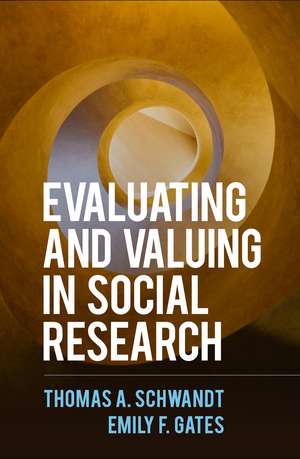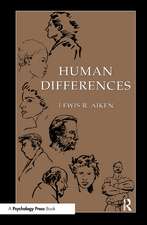Evaluating and Valuing in Social Research
Autor Thomas A. Schwandt, Emily F. Gatesen Limba Engleză Paperback – 26 oct 2021
Winner (Third Place)--American Journal of Nursing Book of the Year Award, Community/Public Health Category
Preț: 309.50 lei
Nou
59.22€ • 61.71$ • 49.04£
Carte disponibilă
Livrare economică 13-27 martie
Livrare express 26 februarie-04 martie pentru 25.70 lei
Specificații
ISBN-10: 146254732X
Pagini: 250
Dimensiuni: 156 x 234 x 15 mm
Greutate: 0.27 kg
Ediția:1
Editura: Guilford Publications
Colecția Guilford Press
Public țintă
Professional Practice & DevelopmentCuprins
2. From Value Neutrality to Morally Informed Research
3. The Conventional Frame for Evaluating Social Interventions
4. Expanding the Conventional Frame for Evaluating
5. An Emerging Alternative Frame for Evaluating
6. Evaluating as a Multifaceted Investigation of Value
7. Valuing, Evaluating and Professional Responsibility
Glossary
References
Notă biografică
Emily F. Gates, PhD, is Assistant Professor in the Department of Measurement, Evaluation, Statistics, and Assessment in the Lynch School of Education and Human Development at Boston College. A recipient of the AEA Marcia Guttentag Promising New Evaluator Award from the American Evaluation Association, Dr. Gates has extensive experience conducting mixed methods evaluations of programs, primarily in K-12 and higher education; science, technology, engineering, and mathematics (STEM) education; and public health. Her research examines the intersecting areas of systems thinking and approaches, values and valuing, and equity in evaluation theory and practice. She was an evaluation fellow in the Office on Smoking and Health at the U.S. Centers for Disease Control and Prevention.
Recenzii
“There is a great deal to love about this thought-provoking book. Schwandt is our most important contemporary philosopher of evaluation. He is precisely the right scholar to further advance thinking on values determination and valuing. It is wonderful to see him thread his ideas on evaluation as a moral practice with Gates’s arguments for using diverse systems frameworks to grapple with competing conceptions of social problems and solutions. The book will push the evaluation field to new ways of thinking about values, valuing, and practice. I am eager to have it on my bookshelf and use it with my students. The goals for evaluation practice laid out in the book are inspiring. I look forward to reading it again and again."--Robin Lin Miller, PhD, Department of Psychology, Michigan State University
"This book presents a compelling case for reconceptualizing the role of evaluation and evaluators in a world beset by 'wicked' problems. To what extent should evaluators function explicitly as moral agents and social critics? The perspective taken by the authors is provocative and powerful, and their analysis deserves to be widely read in the field."--Michael Morris, PhD, Department of Psychology (Emeritus), University of New Haven
"An extraordinary achievement. This book elegantly targets the barriers posed by outmoded beliefs about what constitutes reliable evidence for social interventions. Rich in insight, the book shows that the work of tomorrow’s social changemakers cannot be understood by dividing complex initiatives into isolated, value-free parts. Schwandt and Gates offer both a clear theoretical frame and real-world examples that will enable stakeholders to support more ambitious initiatives to significantly improve lives."--Lisbeth B. Schorr, Senior Fellow, Center for the Study of Social Policy
"The field has sorely needed this book. I am now reading it for the second time and have made it required reading for all of my students!”--Chris L. S. Coryn, PhD, Director, Interdisciplinary PhD in Evaluation, Western Michigan University-Evaluating and Valuing in Social Research presents a sustained reflection on evaluation practice by renowned evaluation professionals Thomas Schwandt and Emily Gates. The book represents a thorough rethinking of evaluation from the ground up. Not just a critique, however, it also presents recommendations aimed at enriching and amplifying the professional practice of evaluation….It is not just that a new frame is emerging; a new frame should emerge. The authors mount a powerful case to support its adoption….The authors argue that the foundations of evaluation practice must be rethought if the profession is to meet the challenges of our time….For those who think evaluation practice would benefit from a thorough critique of its fundamental assumptions, this text is indispensable.--Canadian Journal of Program Evaluation, 6/1/2023
Descriere
Much applied research takes place as if complex social problems--and evaluations of interventions to address them--can be dealt with in a purely technical way. In contrast, this groundbreaking book offers an alternative approach that incorporates sustained, systematic reflection about researchers' values, what values research promotes, how decisions about what to value are made and by whom, and how judging the value of social interventions takes place. The authors offer practical and conceptual guidance to help researchers engage meaningfully with value conflicts and refine their capacity to engage in deliberative argumentation. Pedagogical features include a detailed evaluation case, "Bridge to Practice" exercises and annotated resources in most chapters, and an end-of-book glossary.





















